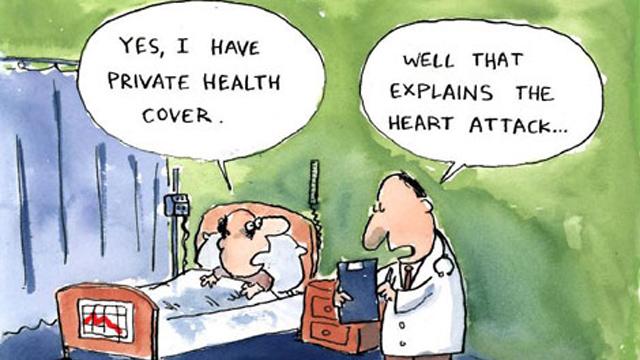
While the mainstream press is helping the Establishment to sing a dirge for the Occupy Movement, this might be a good time to demonstrate your collective financial clout, as well as your ability to make unwanted noises in their direction.
The Occupy Movement needs to be local in order to have local effect. There can be wider effect once the Establishment is on notice that Occupy groups are serious on a nationwide level. One of the best ways to get their undivided attention is to kick them in the money bags—starting with actions to eliminate the private health insurance industry.
According to Noam Chomsky, local control is classic anarchy in action: where the constituents control corporate or national elements. A boss-oriented system can't deal with distributed local control. But, you ask, scattered groups and local actions vs. internationalized Money Bags and giant insurers? Possible?
Why not? It's easier and more effective than you expect: it’s only purchasing power, switched. As the bank robber said, he robs banks because "Banks are where the money is." But local banks are not where the national-governmental clout is. You have clout enough to tackle known governmental-clout if you go about it as a wise consumer in the realm of health insurance.
You already know that most of the Congress is not yet listening to you. They listen regularly to money people—witness the Tea Party's penny-pinching of benefits, not subsidies. Major financial conglomerates, such as the mega-banks and insurance companies, have accumulated reserves and credits from everywhere and anywhere. Those organizations probably will not bend until the Occupy actions begin to hurt them; as long as actions are piecemeal, those not yet approached or attacked will rest. But once the combines begin hurting, the hurtful effects will be distributed nationwide and globally.
Insurance is a numbers game. The commercial insurers create actuarial tables that determine the numbers of types of illness and surgeries most common per thousand premiums-payers, then split those costs plus overhead and profits among policy buyers.
Because U.S. banks are protected by the privately-owned Federal Reserve System, they look first to the essentially unregulated insurance combines: massive amounts of money that are insanely profitable. How profitable? Well, commercial insurance companies admit to 20% profit on health care, after expenses. "Expenses" include office, advertising and sales promotion, political contributions, perks to corporate insurance VPs and high salaries to lawyers whose job is to break policy contracts that threaten to become expensive.
Corporations were once happy with 8% return and ecstatic with 12%. How do they justify 20% profit for paperwork?
Let's not pretend that a few thousand rebellious ex-customers will scare those who deal in the multi-millions. But a few hundred thousand should get their attention. Once you establish the first mechanisms of locally provided health care, and start refusing to pay insurers' insanely high premiums, you'll be able to guide the nation's less-adventurous people who secretly support your viewpoints and actions. And all without leaving your home town.
This is not a dump on commercial insurance policies per se. It's prudent to insure against problems that might or might not arise in any family or life, like fire or major accidents. Those are matters of chance. Traditional insurance methods average those chances-per-thousand and then bill you for likelihood plus expenses and profit—a matter of paperwork.
The catch is this: commercial insurers try to identify those applicants who are most likely to claim—and avoid them. To the healthy and lower-risk crowd, they sell premiums. Thus they avoid true randomness, ie. you can’t buy affordable flood insurance if you live in flood plains. This is equivalent to shimming the wheel in Las Vegas.
However, everyone will need health care throughout his or her lifetime, and the question is only the degree of need. So let's treat it as such, and eliminate overly well-paid middlemen as we develop localized health care infrastructures that work for us. It can be done by individual and groups, and it will spread like wildfire once implemented and demonstrated.
By supporting non-industry health care coverage in your community and region, you will be doing away with the commercial middle-man. It comes down to a pretty straightforward strategy: pay doctors and hospitals more than they get from insurers. And still save money.
This is something that most Americans want to hear. So, let’s get on with the disruption of business as usual.
3 WAYS TO SHOW YOUR SUPPORT
- Log in to post comments











